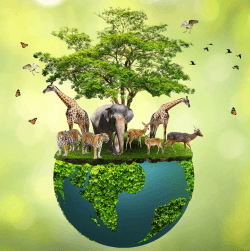🎁 Exclusive Discount Just for You!
Today only: Get 30% OFF this course. Use code MYDEAL30 at checkout. Don’t miss out!
Environmental issues and their impact on human populations and wildlife are growing. Climate change, habitat destruction and the overexploitation of natural resources are escalating and leading to concerning rates of biodiversity loss. The pursuit of mitigating such threats starts with the acknowledgement of human activity as the primary contributor to the problem. Tackling these issues is not only crucial to preserving the natural ecosystems of this planet but a self-serving endeavour for humankind.
The Wildlife Conservation Diploma Course explores wildlife conservation as a holistic field of increasing importance and introduces you to the strategies used to create and maintain a successful wildlife conservation programme.
Centre of Excellence – Wildlife Conservation Diploma Course

What Will You Learn?
The course begins with an introduction to core ecological and biodiversity concepts and how understanding these are fundamental to creating a successful conservation strategy.
We’ll discuss the impact of anthropogenic activities, the different dimensions of threat to wildlife and ecosystems, and how we can go about planning a conservation strategy to combat these threats. We’ll also explore different ecosystem restoration strategies for habitats that have been severely degraded or destroyed.
You’ll learn why biodiversity is at the forefront of conservation efforts, especially the protection of endangered species. We’ll also discuss the various levels of monitoring that are put in place once a wildlife conservation project has been implemented.
Practical case studies of conservation projects teach invaluable lessons, both about success and failure. In the course, we’ll explore case studies and their respective highlights as examples. We’ll also discuss the ethical principles that underlie conservation practices.
Finally, we’ll explore the effects of wildlife conservation and analyse its benefits and costs to human well-being.
By studying this course, you will:
- Understand core ecological concepts
- Learn about wildlife conservation, restoration and monitoring strategies
- Study the anthropogenic impact on wildlife and the benefits of wildlife conservation to humans
- Discover the importance of biodiversity and the protection of endangered species
- Recognise the importance of learning from past conservation programmes
- Become familiar with the ethical principles that underlie conservation practices
Course Syllabus
What will I learn on the course?
Module 1: An Introduction to Conservation
Module 2: Fundamentals of Wildlife Ecology
Module 3: Understanding Anthropogenic Impact
Module 4: Planning a Conservation Strategy
Module 5: Restoration Ecology
Module 6: Endangered Species Management
Module 7: Management and Monitoring for Conservation
Module 8: Wildlife Conservation Case Studies
Module 9: Ethics in Nature Conservation
Module 10: Effects of Conservation on Human Well-Being

Who Would Benefit from This Course?
Nature conservation affects the well-being of all humans, so this course is for everyone. If you are especially interested in nature, animals, the environment, the importance of nature to humans and what can be done to preserve the balance of nature, you’ll really enjoy this course.
If you are considering becoming more involved in conservation and nature, this course will increase your understanding of the field and get you closer to your goal, whether that’s volunteering or going on to further study and a career in wildlife conservation.
Course Features
- Lectures 0
- Quizzes 0
- Duration 10 weeks
- Skill level All levels
- Language English
- Students 94
- Assessments Yes





